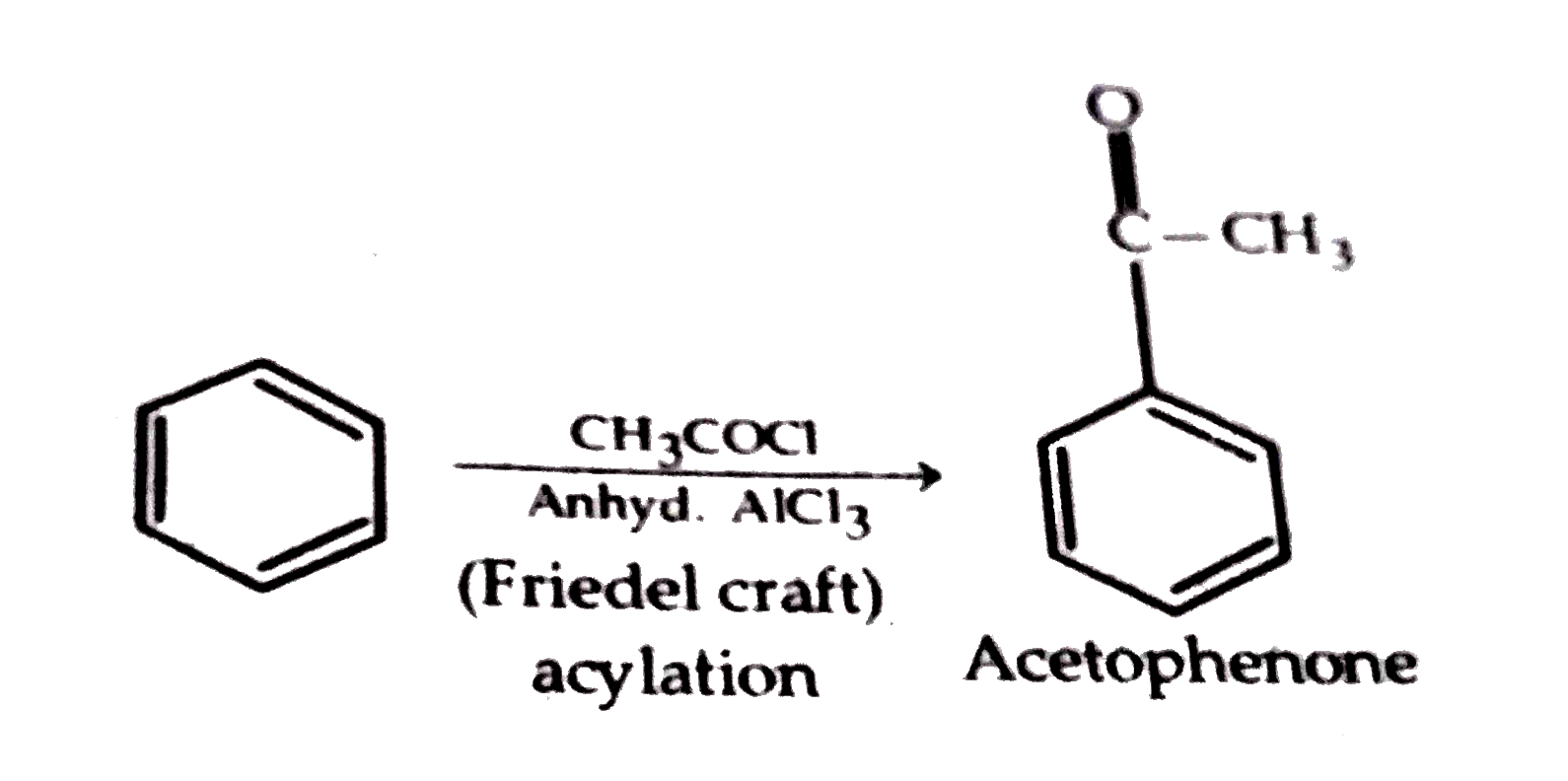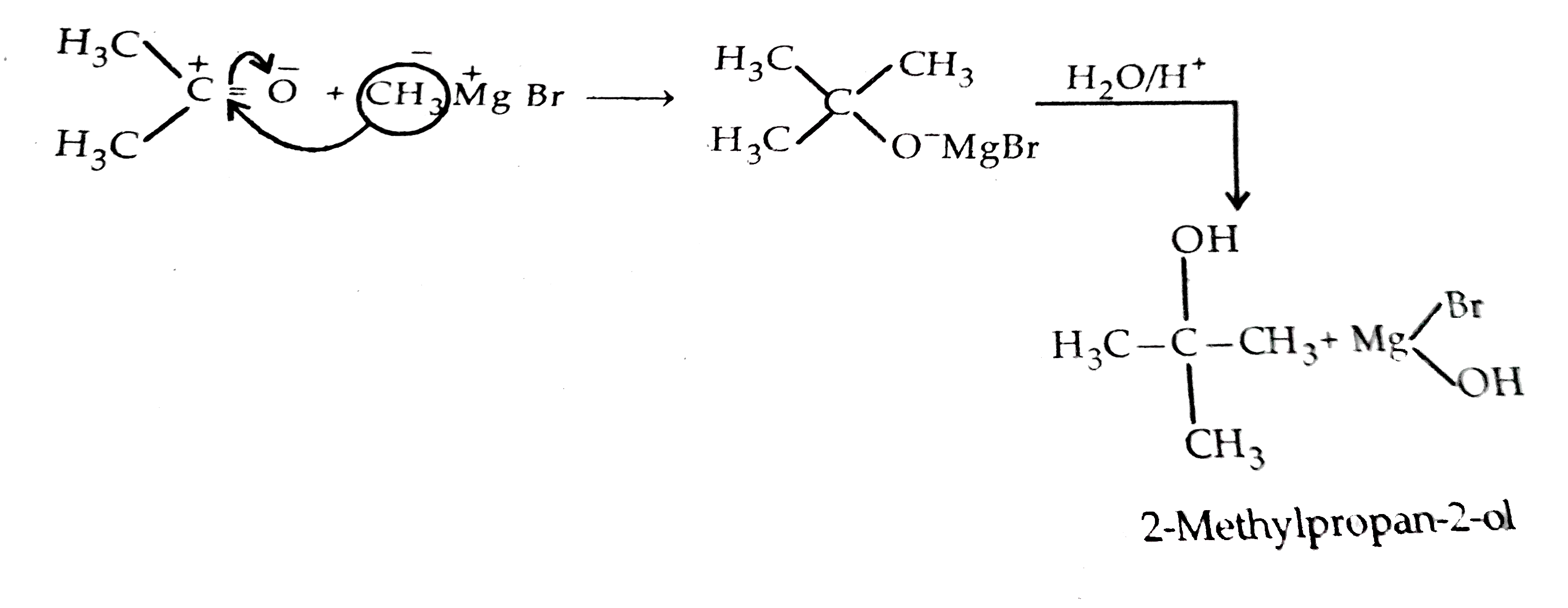(a) How will you convert
(i) Benzene to acetophenone
(ii) Propanone to 2-Methylpropan-2-ol
(b) Give reasons :
(i) Electrophilic substitution in benzoic acid takes place at meta position.
(ii) Carboxlic acids are higher boiling liquids than aldehydes,, ketones and alchols of comparable molecular masses.
(iii) Propanal is more reactive than propanone in nucleophilic addition reactions.
(a) (i) Benzene to Acetophenone

(ii) Propanone to 2-Methylpropan-2-ol

(b) (i) Benzoic acid is meta directing group. It withdraws electrons density from benzene at ortho and para position made meta position comparatively electron rich.

(ii) Carboxylic acids are higher boiling liquids than aldehydes, ketones and alcohols of comparable molecular masses because of following reasons.
(a) Stronger inter-molecular H-Bonds.
(b) As compared to alcohols the O-H bond in carboxylic acids is more strongly polarised due to adjacent electron-withdrawing carbonyl group.
(c ) Due to the formation of cyclic dimers.

(iii) Propanal is more reactive than propanone in nucleophillic addition reaction because in propanone 2-alkyl i.e., electron donating groups are attached whereas in propanal one electron donating alkyl group, is attached , Greater the alkyl group lesser will be the positive charge on the carbon of carbonyl group, less reactive in nulceophillic addition reaction.

Similar Questions
How will you convert the following?
(i) Propan - 2 - ol to propanone.
(ii) Phenol to 2, 4, 6-tribromophenol.View Solution(a) How will you convert the following:
(i) Propanone to Propan-2-o1
(ii) Ethanal to 2-hydroxy propanoic acid
(iii) Toluene to benzoic acid
(b) Give simple chemical test to distinguish between:
(i) Pentan-2-one and Pentan-3-one
(ii) Ethanal and PropanalView Solution
Knowledge Check
- Question 1 - Select One
Arrange these compounds in decreasing order of reactivity for the nucleophilic addition reaction.
(I) Acid chloride (II) Aldehyde (III) Ketone (IV) EsterAI>II>III>IVBIV>III>II>ICIII>II>I>IVDI>IV>II>III
Give reasons for the following :
(i) Methane does not undergo addition reactions, but ethene does.
(ii) Ethyne is more reactive than ethane.
(iii) Hydrocarbons are excellent fuels.View SolutionGive explanation for each of the following :
(i) Why are amines less acidic than alcohols of comparable molecular masses ?
(ii). Why do primary amines have higher boiling points han tertiary amines ?
iii. Why are aliphatic amines stroner bases than aromatic amines ?View SolutionGive reasons : (i) SO2 is reducing while TeO2 is an oxidizing agent.
(ii) Nitrogen does not form pentahalide.
(iii) ICl is more reactive than I2.View SolutionIdentify the correct statement about borazene, B3N3H6.
(i) Borazene is aromatic
(ii) There are four isomers of bi substituted molecule of borazene molecules, (B3N3H4X2).
(iii) Borazene is more reactive towards addition reactions that benzene.View SolutionGive reasons :
(i) CH3−CHO is more reactive than CH3COCH3 towards HCN.
(ii) 4-nitrobenzoic acid is more acidic than benzoic acid.View SolutionGive reasons for i] alkanes are said to be saturated organic compounds ii] alkenes are known as olefins iii) alkenes are more reactive than alkanes iv) ethanoic acid is known as an aliphatic monocarboxylic acid.
View SolutionGive reasons for the following:
(i) tert-buty lbenzene does not give benzonic acid on treatment with acidic KMnO4.
(ii)Normally, benzene gives electrophilic substitution reaction rather than electrophilic addition reaction although it has double bond.View Solution

